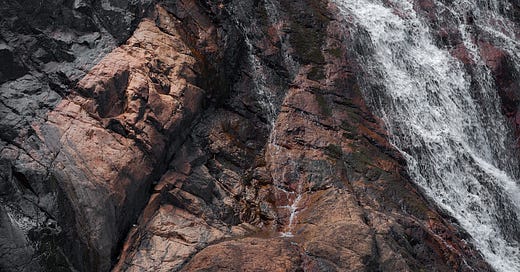I'd like to start the first newsletter of 2024 with some encouragement: be open to your own creativity. Sounds good right? But how can you do that? If you know me, you might not be surprised at my advice on how to do that: avoid the internet as much as possible.
What do I mean by that? The internet appears to be a great place to share photos, videos, drawings, and every other sort of creative work you can imagine. If you make a little film, why not upload it to YouTube? If you're a photographer, surely Instagram is a good place. And if you're a writer...well what about a big literary magazine?
The problem with all these places is that they do not exist to support you. By this, I mean that the creators of most of these platforms did not create them to foster sharing, human connections, and the proliferation of good art. Rather, they were created to make their creators money. Moreover, large online platforms make money in quite a different way than the local photography club that collects a $5 membership fee: online platforms resort to psychological manipulation to promote consumerism, and they make their design choices in order to maximize advertisement views rather than maximize the sharing of photography.
In fact, big tech companies like Google, Facebook, and Adobe constantly aim to create loneliness and supply the drug of fake interaction in order to create addiction and destroy humanity.
Big online platforms encourage you not to create and express yourself, but to grab the attention of others. In other words, by using such platforms, big tech is training you to be a automaton to get the attention of other automatons. These platforms influence you to create for them, instead of for yourself. In the long run, your self-expression will be extinguished and art will lose its healing properties as medicine for the soul.
What to Do
There are a few approaches you can take to limit the harmful effects of soulless big tech companies.
The first is not to panic if you can't stop using them completely! In this modern world, we have to do certain things to survive and maybe you have to use them sometime. For example, I create tutorials and other videos on YouTube, which I just said was a soulless hell platform. That is true. However, there are four keys to using them:
Keep a large body of your work off of them. Know what they are and use them minimally.
Keep true to yourself when you use them. Forget about maximizing subscribers and followers. If you get some, fine, but don't try and copy other styles or things other people are doing when you create content. Just do something you like to do. If you do something that isn't popular, keep doing it. If you do something that is popular, there's nothing wrong with that but don't let it influence your other art.
Use them less and less each year. Attempt to use online platforms as minimally as possible, which means that you should constantly evaluate them. If you feel you can delete and account here or there, or move onto something new and smaller, go for it!
Constantly search for other ways to share that don’t involve technology. Share in person, at small clubs, in your community (if you’re a visual artist, consider giving some of your art to your neighbours), and via emails to individual people.
In my opinion, the fourth point is the most important: do most of your sharing away from big tech platforms. Start small: make a commitment to share one creative work per week with a single individual or small community!
Closing Remarks
Creativity is a fundamental human activity that is nothing else than the expression of your soul.
To keep your creativity alive and functioning freely, it needs to be nurtured from your own ideas and experience. It also needs to interact with the world in a healthy manner. Online platforms like Instagram, Facebook, and pseudo-anonymous sharing are by far the worse places to do it. Local sharing with individuals or on small platforms is the best way.
Keep striving to reduce your dependence on technology, especially the kind that is used by large corporations because the activity of large corporations are the most poisonous kind to human dignity. In addition, the more you spread your own growing philosophy of being yourself, the harder it will be for global consumerism to function.
A healthy, creative mind is fundamentally opposed to the consumerist system and a sufficient number of healthy, creative minds has the potential to destroy it.
Thank you for reading, and if you have any comments, I always welcome them.





Yes!